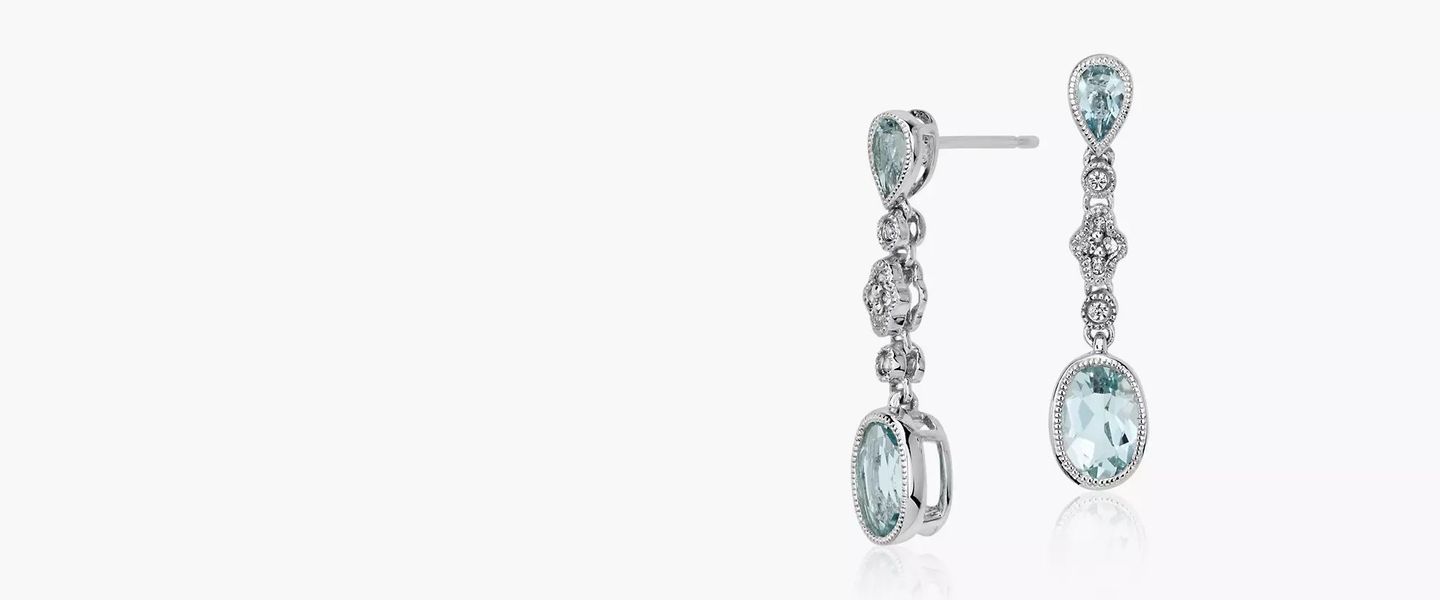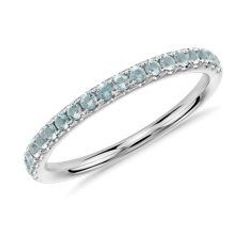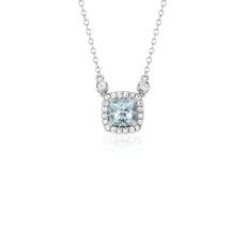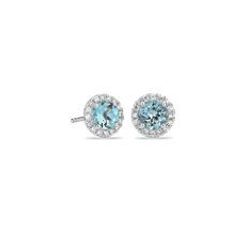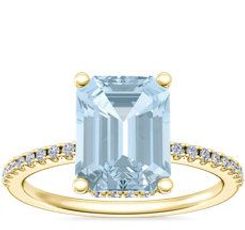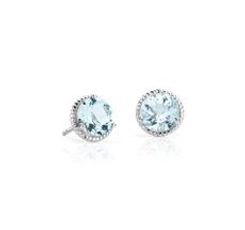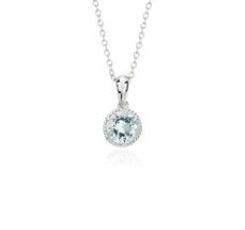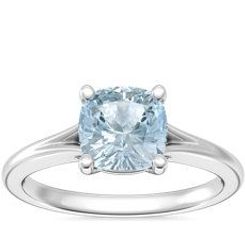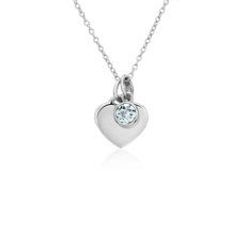What is an aquamarine?
Despite the aquatic lore surrounding aquamarine, it was first mined far from the sea—in Siberia. Today, deposits are found in Pakistan, Russia, China and even California and Colorado. Aquamarine from Brazil is the most valuable—this is where the Queen of England has her aquamarine jewels mined. Aquamarine is the March birthstone.
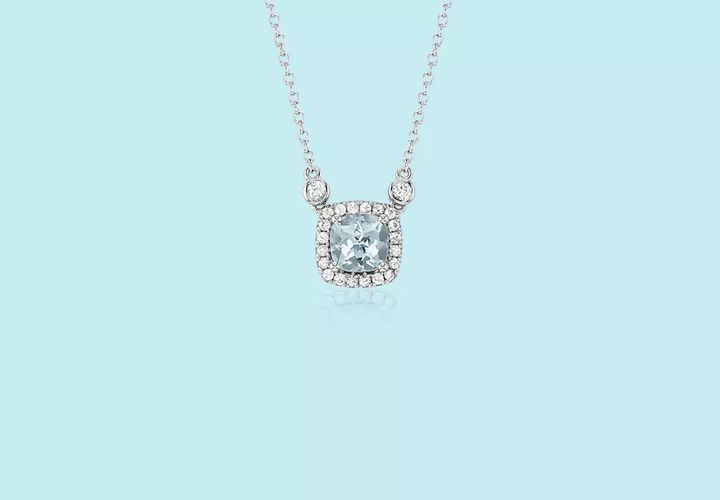
Rob Lavinsky, iRocks.com – CC-BY-SA-3.0, CC BY-SA 3.0,
via Wikimedia Commons / Cropped from original
Mineral: Beryl
Origins: Brazil, Pakistan, Russia, China
Symbols: Calm, Healing
Properties: Creativity, Joy
Durability: 7.5 to 8.0
ENHANCEMENTS
Heated to improve color and clarity
CARE
Basic Gemstone Care
SIMILAR GEMSTONES
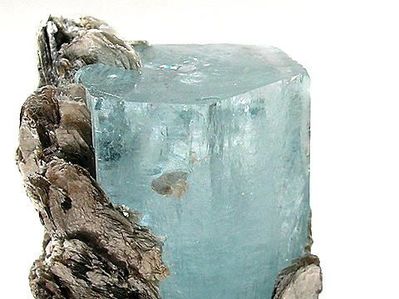
What to Look for in Aquamarines
Aquamarines are easy to find—and afford—in larger sizes than some other gemstones. But bigger isn’t always better with these jewels. More often, aquamarines are valued for the depth and clarity of their color. Below, we’ve gathered the most important points to guide you as you traverse the seas of aquamarine jewelry.
COLOR
Gemstone color is the most obvious feature of a gem. Aquamarines range from mystical icy blues to the darkest teals of the ocean, depending on how much iron is present in the structure of the gem. Deeply saturated blues—closer to the intensity of a sapphire—are more highly valued. Larger gemstones are typically a vibrant blue color, while smaller stones tend to be paler. Popular color variations of aquamarine are identified by their trade names:
Brazilian Aquamarine: “Brazilian” refers to the blue-green color of this type of aquamarine, not that it’s mined in Brazil—although it can be.
Madagascar Aquamarine: This aquamarine isn’t necessarily sourced in Madagascar—rather, the name refers to its medium-blue tone.
Santa Maria Aquamarine: This aquamarine is from the Santa Maria mine in Brazil and is known for its deeply saturated blue color.
Maxixe: Pronounced “mah-she-she,” this aquamarine is a less common variety with a brilliant—albeit unstable—blue color. The blue fades over time into a yellowish-brown when exposed to daylight. Because of this, Blue Nile doesn’t carry maxixe aquamarines."

CUT
The cut of a gemstone highlights the best features of a gem. The cut of your aquamarine enhances its depth of color and gives it a terrific sparkle. Aquamarine facets beautifully. Step cuts, such as emerald and baguette cuts, or a Barions mixed cut showcase the gemstone’s amazing color and clarity.

CLARITY
The clarity of a gemstone depends on whether it has inclusions, which are gas bubbles, liquid, fractures, or crystals embedded in the gem. Aquamarines are a Type 1 gemstone, meaning most stones have an “eye-clean” level of clarity, with few inclusions. But inclusions aren’t always a bad thing—these hitchhikers can add sparkle as they produce an otherworldly reaction called chatoyancy when they’re in the right light. There are two types of chatoyancy that pertain to aquamarines: Cat’s eye chatoyancy is a rare phenomenon where light reflects off inclusions and creates a luminescent beam, similar to that of a cat’s eye. Star chatoyancy is even more rare than cat’s eye. Also known as asterism, it occurs when the light of several cat’s eyes reflect off of each other, creating a star, or asterisk, effect.

SIZE (CARAT)
Unlike diamond size, which is weighed in carats, gemstone size is assessed based on diameter in millimeters. This gives you a more accurate picture of what the gemstone will look like in its setting.

ENHANCEMENT
Many aquamarines are heat-treated to enhance their vibrant blue color. This process doesn’t harm the stone, and the effects are permanent, but because of the unnatural process, heat-treated aquamarine costs less than an untreated aquamarine of the same color. We treat our gemstones with only the highest quality techniques.

HARDNESS & WEARABILITY
The Mohs Scale determines how hard—or durable—a gemstone is. Aquamarine registers between 7.5 to 8, which means it isn’t as hard as a diamond, so it may be prone to chipping and scratching. With a little extra care, though, it’s durable enough to withstand day-to-day wear.

Choosing the Right Aquamarine Jewelry
Is your aquamarine piece just for special occasions, or will it be worn often? For engagement rings or jewelry that will see everyday wear, an elegant round or cushion shape will help prevent chipped edges over time. If the opera is your only destination, a large baguette cut in a ring or pendant might have just the right amount of dazzle for you. As always, choosing a piece of jewelry should boil down to whether you really love it.
Shop Popular Aquamarine Jewelry
Famous Aquamarine Gemstones
Aquamarine was sacred to the Greek God Neptune, who was said to have gifted it to his enchanting sirens. British royalty has also held a soft spot for aquamarine, from the aquamarine tiaras and necklaces of Queen Elizabeth II to the stunning emerald-cut aquamarine ring famously worn by Princess Diana. Aquamarine engagement rings are a beautiful departure from more traditional diamond-encrusted ones, and this icy stone is gorgeous in pendants and earrings.
LEARN MORE ABOUT GEMSTONES
Aquamarines are just one of the many colorful gemstones we offer online and in our stores. Learn the facts about other gemstones, and explore different zodiac signs' compatibility for marriage.
